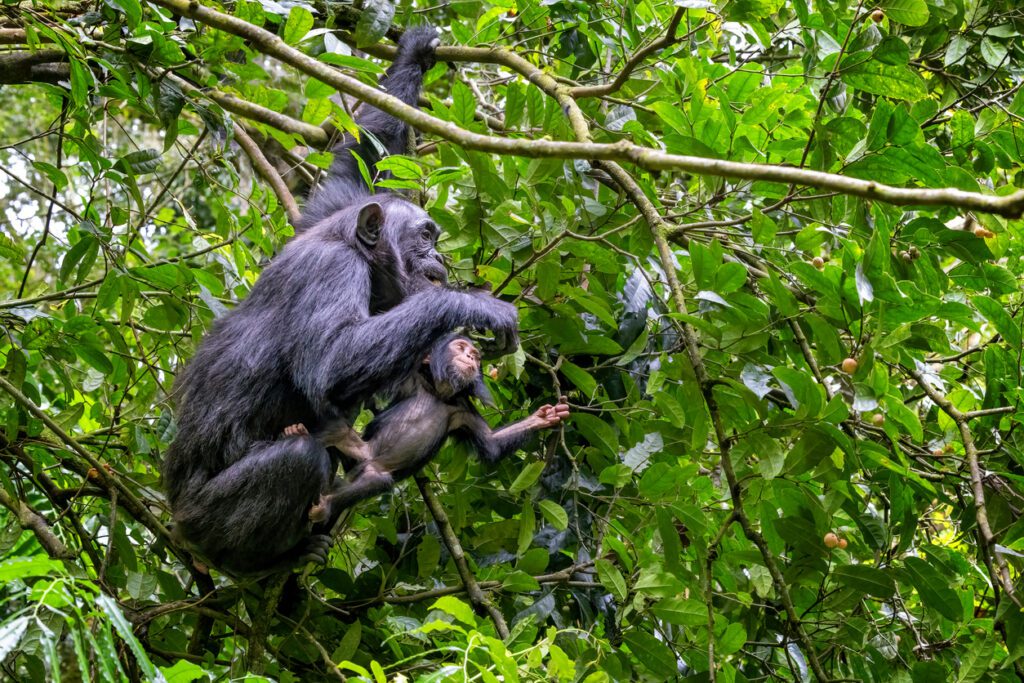What is the natural diet of humans? Are you curious about what our species has evolved to eat? I am, too! With my research on frugivorebiology.com I aim to understand the secrets of our evolutionary diet and help you (and myself) make educated decisions concerning diet. Dive into the free guides and articles for raw, fruit-based healing – based on science and experience and free of dogmas.
On the quest for the species-appropriate diet of humans
After coming across mind-blowing but intriguing information about humans possibly being biological frugivores, I started to search for evidence – and challenge the common perception of humans as typical omnivores. By exploring the question, “Are we frugivores, like all apes?” we go on the quest to find the species-appropriate diet and the dietary past of humans.

Why does it matter?
Knowing our deep dietary past – our species-specific eating patterns – is the compass in the growing contradictory jungle of diets. The truth is simple, the opposite of confusion!
Therefore, to find biologically sound and plausible answers about the natural human diet, biology must meet nutrition! I gather and investigate unconventional information for anyone seeking to take their health into their own hands. Can I ever prove to what diet we are best-adapted to? Probably not, but having a fresh and deep look into our dietary biology can give us solid information to broaden our view – and finally decide for ourselves!
I investigate with an open mind, free of dogmas and the best intentions for your health
My values are asking questions dogma-free, approaching the answer science-based, and driven by the highest intention to help people make the best possible decision for their diet.
Know your biology – know your diet
Species-appropriate (or species-specific) nutrition and lifestyle require re-discovering the original human ecological niche, our place in nature. Further, besides studying biological aspects, this journey also includes learning to trust our instincts and knowledge. Gaining a truly new perspective and seeing the bigger picture helps us make the healthiest decisions.

Becoming aware of our biology and embracing it, is essential on this path. Sticking to the human ecology and striving to imitate the habitat within we have evolved, will maximize our amazing self-regenerative life force that is present within all living beings and – by default – is programmed to strive towards “survive and thrive” every single instant. We just need to stop sabotaging ourselves with the constant toxic overload of “modern” life and with a diet that is far away from what our biology demands. Just watch the miracle unfold…
Recognizing biology and evolution as the most important cornerstones in nutrition!
Why are biology and evolution widely neglected – and often ignored in nutritional questions and sciences?
For all other animal species, it is a no-brainer: we need to feed them what they have evolved to eat. Otherwise, they suffer from poor health! Weirdly, the same essential question hardly seems to emerge when it comes to humans. Why is this so? Unfortunately, I have no answer to this question other than ignorance or financial interests.
As a biologist, I often face a weird stigma of either being a “green botanist” or a “laboratory geek.” And while I wish I knew more about those two particular fields (I wish I knew everything!), I am neither of the two! I am interested in health and nutrition within the context of biology. But I hear the question over and over again: what does biology have to do with health? Or nutrition? The answer is everything!
Biology is the study of how life functions. Nutrition of organisms is a sub-topic of biology, and human nutrition is only a small area of all areas in biology. However, nutrition is often perceived as a separate discipline – when, in reality, it is interconnected with all fields of biology. Here, I share some thoughts and what I have experienced as someone connecting the two fields.
While fields like environmental medicine, nutrigenomics, or evolutionary nutrition actually exist, they are small and hardly known to the general public and are even widely ignored when it comes to answering important questions in human health!
One widely neglected discipline is comparative anatomy and physiology in dietary biology: comparing adaptations and diets of humans and their closest relatives. One of the few researchers who have taken on this field is Prof. Katharine Milton, whose scientific work I cite often – after all, this site is investigating these topics.
Human health and nutrition can only be understood entirely in the framework of our evolutionary past and understanding the environmental changes that we are facing today!
Even in nutrition, nothing makes sense except in the light of evolution!
Humans have evolved as frugivores.
Editorial policy
While biology, the bigger picture of nature, and real-life experience are the backbone of the content on frugivorebiology.com, it’s my standard to back up the information with highly credible sources, mainly from peer-reviewed literature. I aim to discover something new in every piece of content to gain a new perspective on the human diet. Everything that is published is written by real people (no AI generated content) for people!
